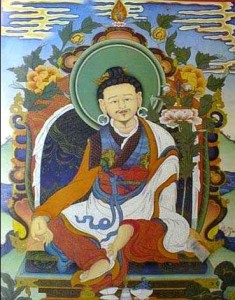The following is respectfully quoted from “Treasury of Precious Qualities” by Jigme Lingpa translated by the Padmakara Translation Group:
The Karmic Process in General
There is absolutely no doubt that when we die, we must go where we are propelled. Like fish caught on a hook, we are entangled in the strings of our karma and pulled into one or other of the six realms, high or low. This is nothing but the effect of actions, positive or negative. It is true that, ultimately speaking there is no such thing as origination, but on the level of relative truth, the karmic principle of cause and effect as inescapable. It is like a gardener planting two kinds of seed, the bitter aloe or sweet grape. The resulting crops will have a corresponding taste. In the same way, the existential quality of our present lives, whether fortunate or otherwise, is but the product of positive or negative actions to which we have become accustomed in our previous existences.
Actions never fail to produce an effect
The shadow of a bird soaring in the sky may be temporarily invisible, but it is still there and will always appear when the bird comes to earth. In the same way, when attendant causes coincide with the factors of Craving and Grasping, karma comes to fruition and results in a life situation that is either favorable or unfavorable. As the sutra says, “The karma that living beings gather is never worn away even after a hundred kalpas. When the moment comes and the appropriate conditions gather, the fruit of the action will come to maturity.”
For as long as phenomena are apprehended as truly existent, even small negative actions are liable to have immense consequences. They are likened in the root verse to a monstrous fire-vomiting mare–a reference to the volcanoes that encircle and ocean of brine on the rim of the world. The fire of those volcanoes is able to dry up the countless waves of the sea that here symbolize happy incarnations, the fruit of positive action. It is important to study the sutras such as the Saddharmasmrityupasthana, Karmashataka, Lalitavistara, and Karmavibbanga, for they describe how our human condition, which is like a ship in which we can sail to the precious isle of Omniscience, may be wrecked and brought to utter ruin.
The results of evil deeds, namely, the lower realms so full of dreadful and inescapable misery, are said in the root text to have been unable, for the moment, to overwhelm our strength, our army of ten “virtues tending to happiness”–in other words, our fortunate existence in higher states. These virtues are like heroes whose land is not yet overrun by the legions of suffering. And yet if our determination weakens, we shall fall into the ten evil actions and thence into lower existences. There are many ways in which this might happen. Some people, aspiring to liberation, receive the vows of pure discipline from their abbots or preceptors. But tempted by desire or other evil thoughts, they break their commitments and fall, defeated in their monastic resolve. Again, some people kill animals for the sake of gain, thereby shortening their own lives. Some, out of aggression, go off to war only to be killed themselves. Some, inspired by virtue, embrace an ascetic discipline, becoming indifferent even to food and clothing. But later, victims of their desire, they settle down to married life. Some devote themselves with great effort to study and reflection, but they are unable to free themselves of the eight worldly concerns and are carried away by mundane preoccupations. Some, instead of offering their wealth to the Three Jewels, lavish it on their relatives and squander it.
On the whole, a moral conscience with regard to oneself and one’s religious values, and a sense of shame in respect of the opinions of others, are two factors that work in tandem to put a brake on evil behavior. Some people, however, abandon both their conscience and their sense of shame. They disregard virtuous conduct and in one way or other indulge in evil, succumbing to the habits they have grown accustomed to from time without beginning. This is how people fall into the lower realms and stay there.












Thank you, Jetsunma. I pray that I may come to really understand karma and thus be diligent on the path.